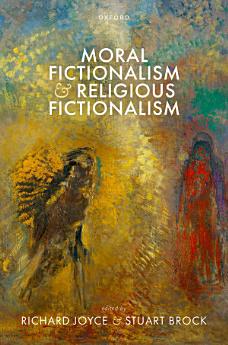Moral Fictionalism and Religious Fictionalism
Richard Joyce · Stuart Brock
Nov 2023 · Oxford University Press
Ebook
272
Pages
family_home
Eligible
info
reportRatings and reviews aren’t verified Learn More
About this ebook
Atheism is a familiar kind of skepticism about religion. Moral error theory is an analogous kind of skepticism about morality, though less well known outside academic circles. Both kinds of skeptic face a “what next?” question: If we have decided that the subject matter (religion/morality) is mistaken, then what should we do with this way of talking and thinking? The natural assumption is that we should abolish the mistaken topic, just as we previously eliminated talk of, say, bodily humors and unicorns. The fictionalist, however, offers a less obvious recommendation. According to the fictionalist, engaging in the topic in question provides pragmatic benefits that do not depend on its truth-in a way roughly analogous to engaging with a novel or a movie. The religious fictionalist maintains that even if we were atheists, we should carry on talking, thinking, and acting as if religion were true. The moral fictionalist maintains a similar view regarding moral talk, thought, and action. Both forms of fictionalism face serious challenges. Some challenges can be levelled at either form of fictionalism (or at any form of fictionalism), whereas others are problems unique to moral fictionalism or to religious fictionalism. There are important questions to be asked about the relationship between these two kinds of fictionalism. Could moral fictionalism be plausible even if religious fictionalism is not (or vice versa)? This is a volume of thirteen previously unpublished papers on the topics of religious fictionalism, moral fictionalism, and the relation between these views.
About the author
Richard Joyce received his PhD from Princeton in 1998. Over the following years he held academic positions at the University of Sheffield, the Australian National University, and the University of Sydney, eventually taking up a professorship at Victoria University of Wellington in 2010. He is the author of Essays in Moral Skepticism (OUP, 2016), The Evolution of Morality (MIT Press, 2006), and The Myth of Morality (CUP, 2001). In addition, he has edited several collections and has published numerous journal articles and book chapters, largely in the areas of metaethics and moral psychology. Stuart Brock is a Professor of Philosophy at Victoria University of Wellington. He received his PhD from Princeton in 2002, and subsequently taught at Western Washington University. He has published numerous journal articles and book chapters on fiction and fictionalism. He is co-author of A Critical Introduction to Fictionalism (Bloomsbury, 2018) and Realism and Antirealism (Routledge, 2007) and co-editor of Fictional Objects (OUP, 2015).
Rate this ebook
Tell us what you think.
Reading information
Smartphones and tablets
Install the Google Play Books app for Android and iPad/iPhone. It syncs automatically with your account and allows you to read online or offline wherever you are.
Laptops and computers
You can listen to audiobooks purchased on Google Play using your computer's web browser.
eReaders and other devices
To read on e-ink devices like Kobo eReaders, you'll need to download a file and transfer it to your device. Follow the detailed Help Center instructions to transfer the files to supported eReaders.






